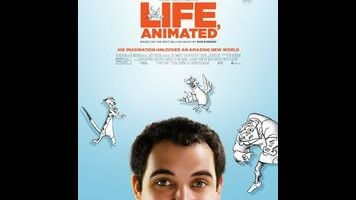A love of Disney helps an autistic adult understand the world in Life, Animated

Someone who didn’t know Owen Suskind might be a little alarmed if they randomly encountered him. In Roger Ross Williams’ documentary Life, Animated, Owen’s frequently seen mumbling to himself, while haphazardly pacing around, in a manner that some might interpret as “disturbed.” But very few of Owen’s quirks and ticks are random. He doesn’t always look where he’s going because he tends to be overwhelmed by the common stimuli of light and noise. And the murmuring? That’s movie dialogue, which he recites to calm himself and to help him make sense of everyday experiences. Owen’s friends and family members know all this. And just about any parent of a child with autism would also recognize right away what he’s doing, and why.
Those same parents are bound to experience a spark of recognition throughout Life, Animated—especially when they hear Owen’s parents Ron and Cornelia recall the moment when they realized their son was different. Ron describes how Owen started losing his ability to communicate and move neurotypically around age 3, and how when they took him to a specialist and watched the diagnostic session from behind a two-way mirror, Ron thought to himself, “Just walk like you used to walk.” There were a lot of complicated emotions at play back then. The Suskinds wanted Owen to be himself, but they also hoped someone would tell them that everything was going to be okay, and that one day Owen could have a breakthrough and be “fixed.”
Ron Suskind told Owen’s story in a bestselling book, also called Life, Animated. The documentary covers a lot of the same ground, recounting the startling turnaround the family experienced once Ron figured out that Owen’s seemingly nonsensical babble was actually lines from his favorite Disney cartoons. After the Suskinds made that connection, they were able to start having actual conversations with their child, and to help him extrapolate from the emotions and situations in those films to what he was going through in real life. Now in his early 20s, Owen’s become an internationally recognized spokesperson for the concept of “affinity therapy,” which uses the hobbies and interests of kids on the spectrum as a way of teaching them life skills, rather than treating their single-minded obsessions as a crippling disability.
Williams illustrates the upbeat, inspiring parts of Life, Animated via interviews with Ron, Cornelia, and Owen’s older brother, Walt, supplemented by animated segments. The drawings help evoke the magic of discovery, from those thrilling early years when Ron came to understand the depths, nuances, and sophistication of what Owen was trying to express through Disney quotes. To that, Williams adds scenes that show how even today Owen prepares for big moments—like packing up and moving to his own apartment—by watching scenes from the likes of Peter Pan, Dumbo, and Bambi that provide him a rough understanding of what it means to grow up.
But those fly-on-the-wall scenes go beyond simple “Disney as a guide for life” boosterism. As Owen transitions to adulthood, he handles heartbreak, loneliness, the search for fulfilling work, and other real-life situations that—as Walt notes—aren’t covered in the sanitized, sexless, happy-ending world of Aladdin or The Little Mermaid. Williams smartly devotes large portions of the documentary to Owen on his own, letting him explain his fears himself rather than relying on the other Suskinds for clarification and translation. That’s been a welcome trend in fiction features and docs about autism over the past half decade: They’ve been increasingly treating their subjects as unique and fully human individuals, rather than defining them only by their symptoms or by what they mean to their parents and siblings.
Life, Animated feels somewhat out of balance and incomplete, given that Owen’s barely into adulthood. A film that was either only about the Suskinds’ Disney revelation or only about Owen’s efforts to live independently might’ve had a stronger focus. But it’s hard to nitpick too much, given how insightful and emotional so much of this documentary is. Williams really gets at the importance of scripts to the lives of so many children and adults on the spectrum. And Life, Animated is also heartbreakingly honest about how hard it is for parents to let children go off on their own, weaknesses and all. On the list of Disney-related 2016 releases about child-rearing and handicaps, this one goes just above Finding Dory. What it lacks in wacky hijinks, it makes up in hard truths.